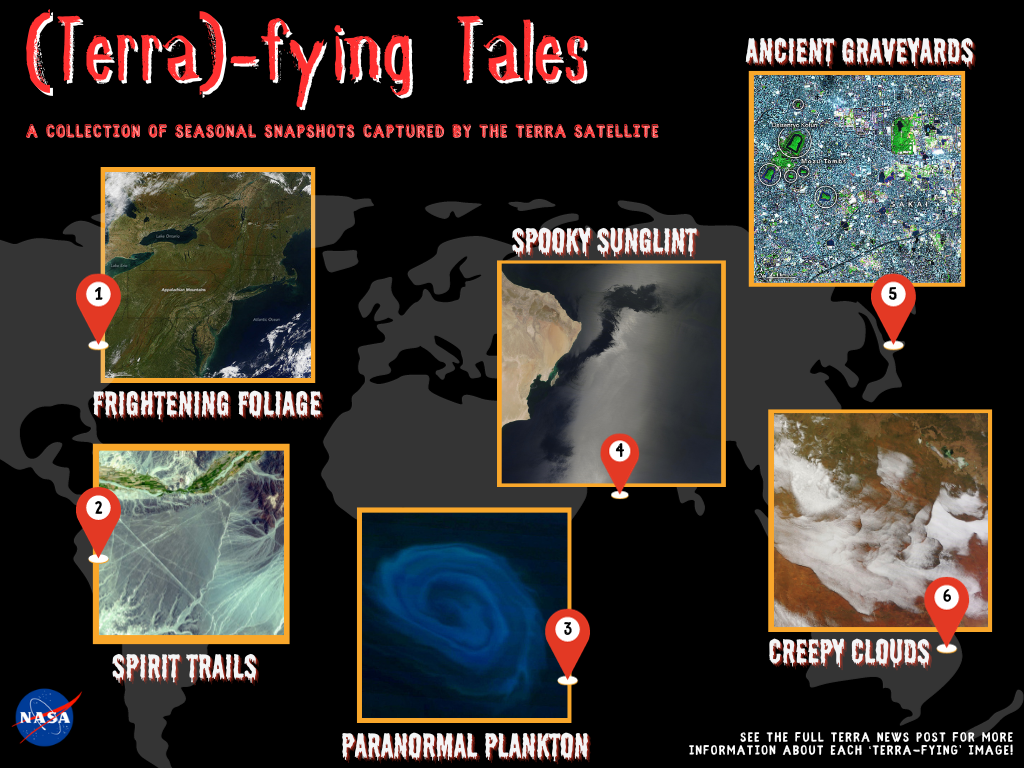Past News
- December 2025
- October 2025
- July 2025
- May 2025
- February 2025
- November 2024
- April 2024
- February 2024
- December 2023
- October 2023
- April 2023
- February 2023
- December 2022
- October 2022
- August 2022
- July 2022
- June 2022
- April 2022
- March 2022
- October 2021
- September 2021
- August 2021
- June 2021
- May 2021
- April 2021
- March 2021
- February 2021
- January 2021
- September 2020
- August 2020
- July 2020
- April 2020
- February 2020
- January 2020
- December 2019
- November 2019
- October 2019
- September 2019
- August 2019
- April 2019
- March 2019
- November 2018
- October 2018
- August 2018
- July 2018
- June 2018
- May 2018
- November 2017
- June 2017
- August 2016
- July 2016
- June 2016
- May 2016
- April 2016
- March 2016
- February 2016
- January 2016
- December 2015
- November 2015
- October 2015
- September 2015
- August 2015
- April 2015
- February 2015
- December 2014
- November 2014
- October 2014
- September 2014
- August 2014
- May 2014
- April 2014
- March 2014
- February 2014
- January 2014
- December 2013
- November 2013
- October 2013
- September 2013
- August 2013
- July 2013
- June 2013
- May 2013
- April 2013
- March 2013
- February 2013
- January 2013
- September 2012
- June 2012
- May 2012
- April 2012
- March 2012
- February 2012
- January 2012
News By Instrument
News By Science
- Air quality
- Applications
- Atmosphere
- Carbon Cycle and Ecosystems
- Climate Variability and Change
- Data
- Earth Observatory
- Earth's Surface and Interior
- Education
- Energy Cycle
- Events
- Human Dimensions
- LAADS DAAC
- Landsat
- Orbital Changes
- Platform
- Resources
- Terra Talent Series
- Terra Visits Camp Landsat
- VIIRS
- Water Cycle
- Weather
- Wildfire
Category: News and Events
News and Events
Happy 24th Birthday, Terra!
(Terra)-fying Tales
Happy Halloween 2023, from the Terra mission! Enjoy this ‘spooky’ set of (Terra)-fying imagery that highlights some of Earth’s strangest costumes (as well as past NASA Earth Observatory images featuring Terra!)
- Frightening Foliage: The bright colors of Fall in New England (USA) take center stage in this October imagery from 2015. For more information, view “Fall Color Arrives in the U.S. and Canada” (linked here).
- Spirit Trails: Terra imagery illuminates what are thought to be walking trails once used for religious ceremonies by the ancient Nazca people. Check out the Earth Observatory series on Nazca lines in Peru (linked here).
- Paranormal Plankton: Terra captured this eerie swirling eddy of blooming phytoplankton off the coast of South Africa (learn more in “The Eddy and the Plankton” article, linked here!).
- Spooky Sunglint: A dark spirit-like intrusion breaks into the bright glint of reflected sunlight off the coast of Oman, in an optical illusion caused by the less-reflective current of turbulent waters. (Featured in both Earth Observatory and a major news outlet, both linked here.)
- Ancient Graveyards: From above, Terra views what appear to be emerald key holes, but that are actually massive ancient burial sites in Japan! For more information on these incredible tombs, check out “A Burial Site Fit for an Emperor,” linked here.
- Creepy Clouds: These ghastly clouds over Australia offer a real modern-day mystery in how they were formed! (But similar events have been caused by atmospheric gravity waves — read more in “Curious Waves of Clouds Across Australia,” linked here!)
2023 Terra Updates
Terra Operational Changes and Data Updates
Over the past three years, the Terra mission has performed multiple maneuvers that have led to changes in the satellite’s consistent 20+ year orbit*. Today, Terra continues slowly drifting to an increasingly earlier overpass time and lower altitude. While the orbital changes have had little to no impact on instrument data collection or quality, data users have expressed the need for regular updates on Terra’s equator crossing time (in Mean Local Time), as well as orbital altitude. Starting this month, we’ll be adding this information to the Terra homepage and updating it bi-weekly using data provided by the Flight Dynamics Team.
Finally, processing of ASTER data has re-started, with updated Level-1processing to account for the lower Terra orbit. Processing of the previously-collected data since late October 2022 to the end of June 2023 is also taking place. See the infographic provided on the Terra website for more information, and for the latest news on all things related to Terra data, visit the Alerts and Issues page available on the LAADS DAAC website (linked here).
*For more information about Terra’s orbit changes, check out the January/February 2023 edition of The Earth Observer — linked here — for summaries of two recent NASA-hosted webinars pertaining to these changes, or visit the Terra website.
Terra Instrument Check-In
Here’s a list of 2023 happenings and publications for each Terra instrument:
ASTER:
The 52nd ASTER Science & Interface Meeting was held at the Kikai Shinko Kaikan in Minato-ku, Tokyo, Japan from September 11-15, 2023 (group photo posted below). The meeting included two Plenary sessions, as well as presentations from ASTER working groups, including Operations and Mission Planning (OMP), Applications, Calibration and Validation, Temperature-Emissivity Separation (TES), and the Science Team Acquisition Request (STAR) groups. Meeting presentations showcased diverse applications of ASTER data in various fields and activities, including mineral and other geologic mapping projects, coastal monitoring activities, cryospheric studies, machine learning models for urban land dynamics, and volcanic eruption precursor detection. Additionally, updates were provided on the ASTER Volcano Archive and the Global Land Ice Measurements from Space (GLIMS) Database. A copy of meeting presentations are available upon request.
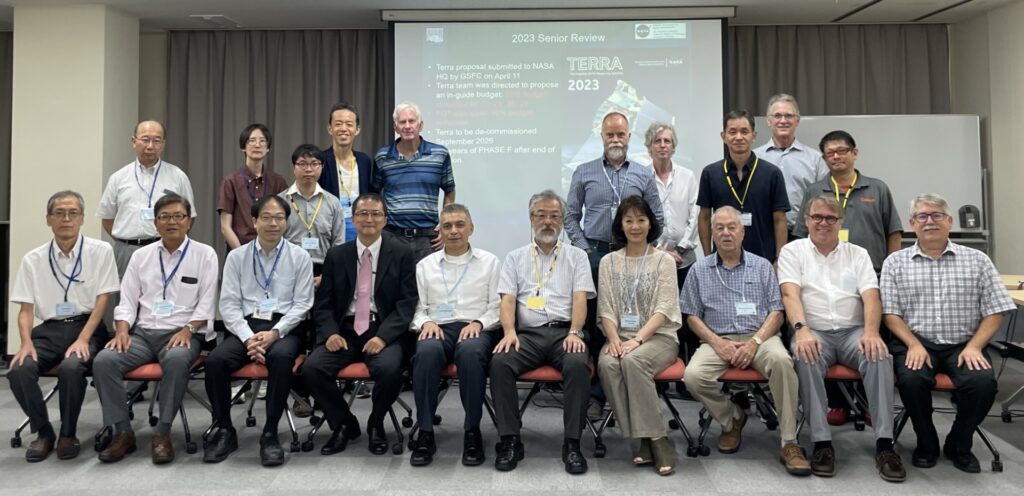
CERES:
The next CERES meeting will be held in-person from October 17-19, 2023 at NASA Goddard Institute for Space Studies, in New York City, NY. See the “Meeting Logistics and Recommended Hotels” link on the CERES website for more information about attending the meeting and a link to the full agenda (also linked here). Many exciting speakers are scheduled to speak at the meeting, so check back to the Terra website often for an update and summary after the meeting!
MISR:
The MISR team has been working hard on algorithm adjustments needed to finalize the Level-1 data processing take into account the effects of Terra’s orbit lowering in October 2022. Additional updates on the status of this process will be posted on the Terra website, including a notice when processing has begun.
MISR was highlighted during a biannual summer workshop, hosted by NASA Disasters program, to support dialogue and collaboration between NASA experts and members of the Volcanic Ash Advisory Centers (VAACs) team. Find out more about this partnership in a recently-published story from the Disasters program, linked here!
MODIS & MOPITT:
Miguel Román (MODIS) and Helen Wooden (MOPITT) both attended the European Organisation for the Exploitation of Meteorological Satellites (EUMETSAT) Meteorological Satellite Conference 2023 that took place in Malmö, Sweden, from September 11-15, 2023. A (beautiful) group photo from the meeting is included below.
Miguel Román participated in several sessions to discuss EUMETSAT’s plans for morning-orbit polar orbiting observations. As recommended by NASA’s Terra, Aqua, and Aura Data Continuity Workshop, the EUMESAT Multispectral Visible Infrared Imager (METImage) on the Metop-SG A satellite, due to launch in December 2024, is being explored as a possible source of morning data product continuity, currently represented by the suite of standard science products generated from the MODIS instrument onboard Terra.
Helen Worden presented trends using the MOPITT data record of global carbon monoxide (CO) and plans for continuation of the MOPITT record using MetOP/IASI, NOAA/CrIS and ESA/TROPOMI data. The MOPITT team has long collaborated with the EUMETSAT IASI instrument team on satellite data inter-comparisons. Comparisons with MOPITT data have been especially important for new instruments in space, since MOPITT has the longest available record of satellite CO observations. The EUMETSAT meeting had many useful presentations on atmospheric composition and trends, among other interesting topics, with plenty of networking opportunities for developing new ideas for research and plans for data continuity.
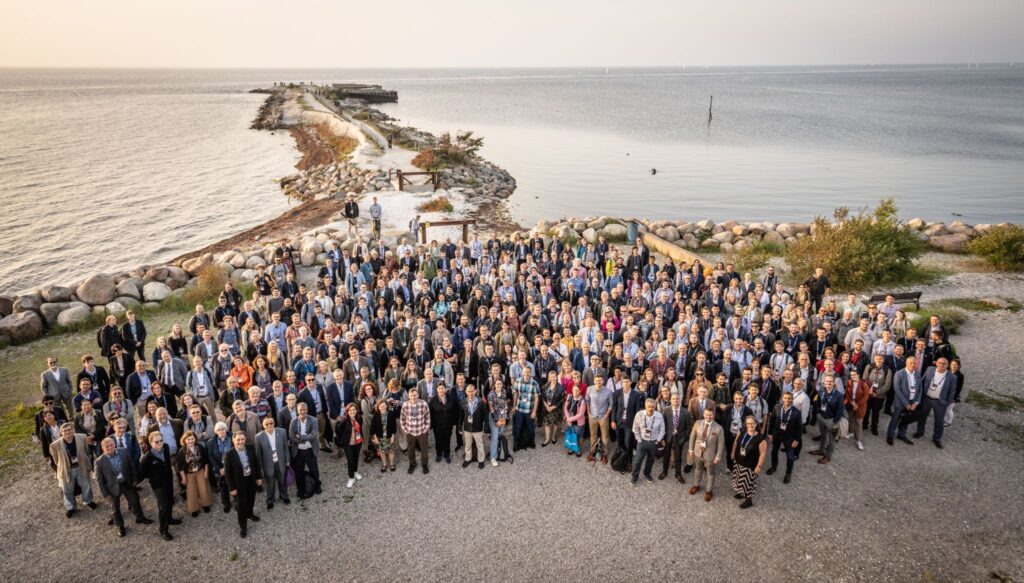
NASA Celebrates Earth Day!
April 20th is officially “Earth Day,” and NASA is celebrating with a hybrid event! Join us in-person (if you’re close to Union Station in Washington D.C.) or online! See the official NASA Earth Day website (linked here) or scan the QR code on the graphic below for more information and (free!) registration! (And if you’ll be joining us online, there’s a sneak preview of NASA’s all new interactive online platform called NASA Science Now — linked here and example shown below!)

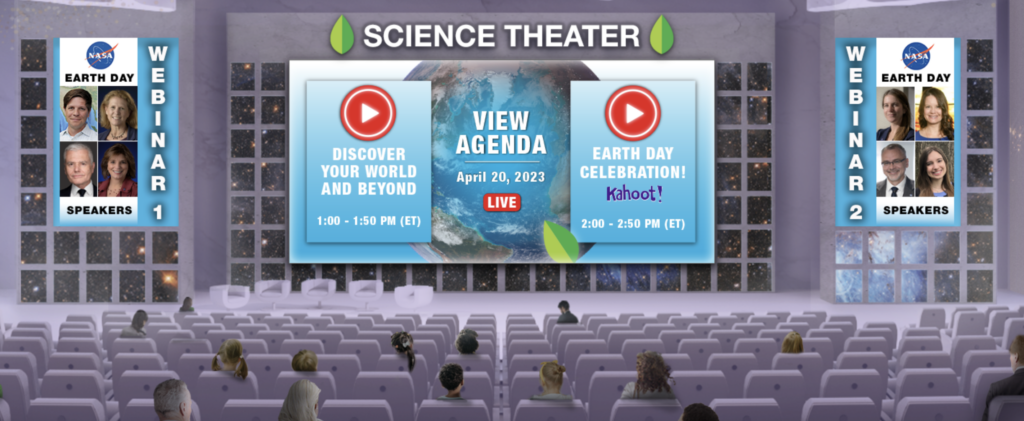
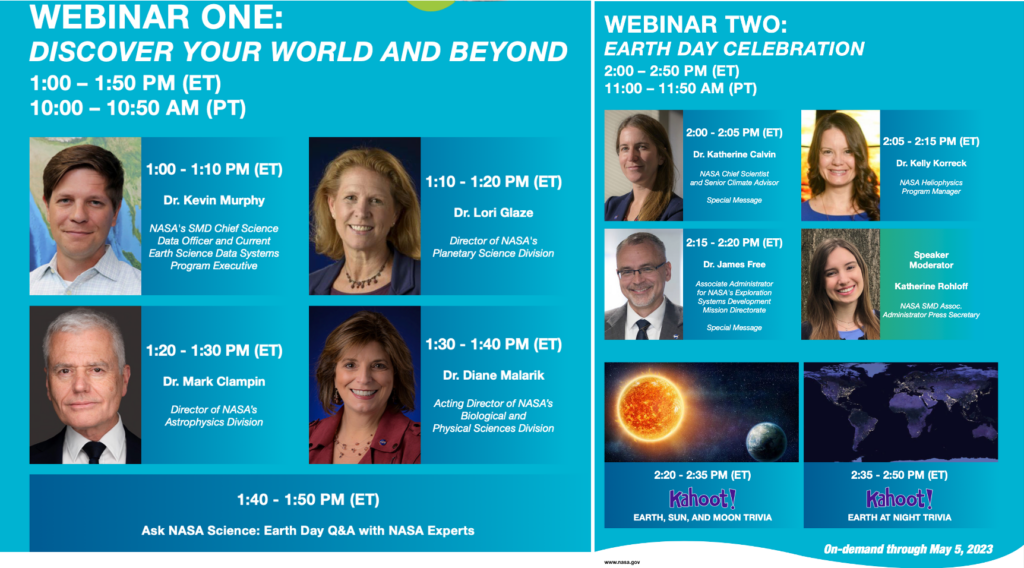
Spring Updates from the Terra Team
Spring is here — and so are the Terra science team meetings and workshops! Here’s a list of upcoming Team Meetings and Workshops related to the Terra mission, with additional information about each in the post below this list.
- 2023 MODIS/VIIRS Science Team Meeting
- 2023 NASA Land-Cover and Land-Use Change (LCLUC) Science Team Meeting
- CERES 38th Science Team Meeting
- UCAR Remote Sensing Initiative Workshop
- NASA’s Terra, Aqua, and Aura Data Continuity Workshop
2023 MODIS/VIIRS Science Team Meeting
The MODIS/VIIRS Science Team Meeting will be held May 1- 4, 2023 at The Hotel at The University of Maryland. Registration will be available soon. Stay tuned to the MODIS Website for more information as it’s made available.
2023 NASA Land-Cover and Land-Use Change (LCLUC) Science Team Meeting
NASA’s Carbon Cycle & Ecosystems (CC&E) focus area will be hosting the next Joint Science Workshop (JSW) on May 8-12, 2023 at The Hotel in College Park, MD. The first two days (May 8-9) will be LCLUC meeting with an emphasis on the early career scientists’ projects. Next two days will be joint meeting with other NASA Earth Science programs of the Carbon Cycle and Ecosystems Focus Area at plenary sessions. For more information, visit the LCLUC Meeting website.
CERES 38th Science Team Meeting
The CERES 38th Science Team Meeting will be held May 9-11, 2023 at the Pearl Young Theater on the campus of Langley Research Center, Hampton VA. For more information and a PDF of the agenda, please visit the CERES website.
UCAR Remote Sensing Initiative Workshop
This new Initiative provides a focal point for UCAR satellite remote sensing instrumentation, data and science activities, and promotes collaboration across the organization. For more information on this event, visit the UCAR Remote Sensing Initiative website.
NASA’s Terra, Aqua, and Aura Data Continuity Workshop
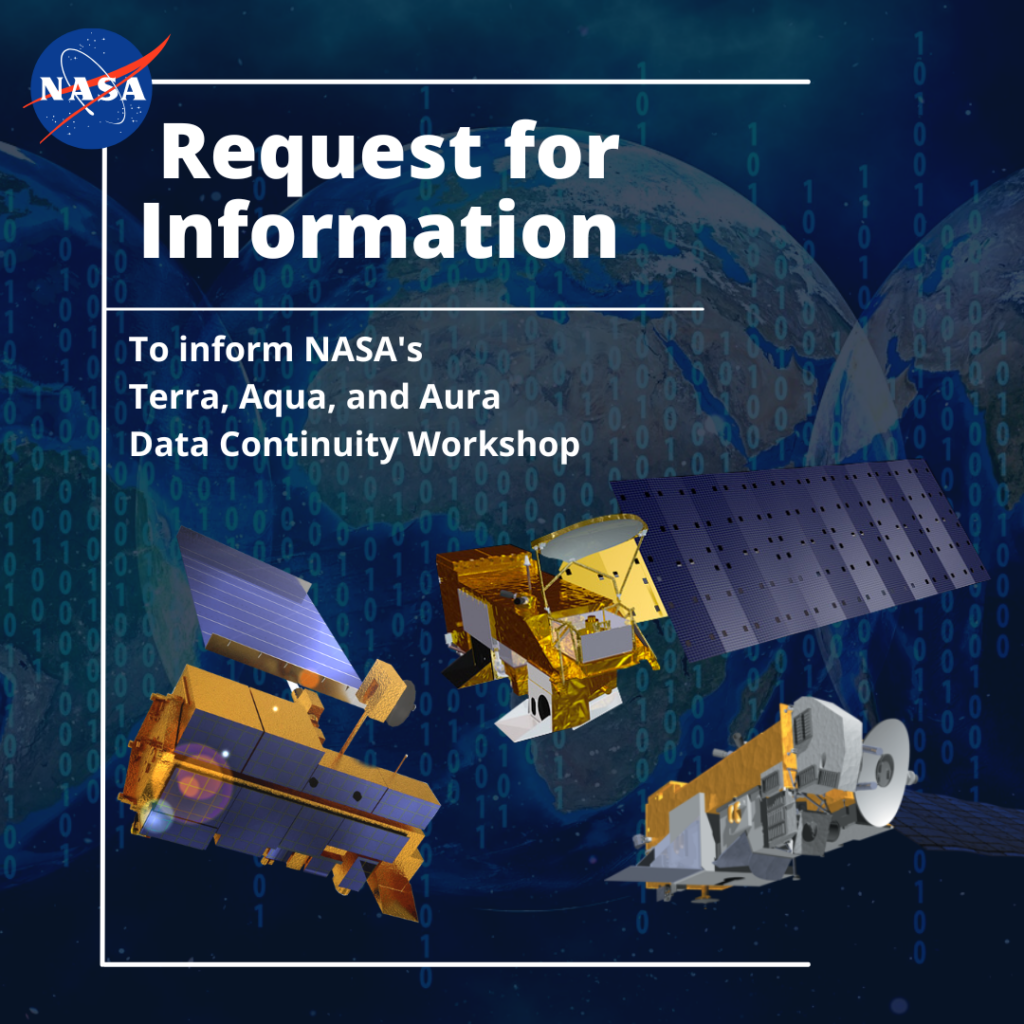
NASA recently released a new NASA Request for Information (RFI), seeking input from the science community and stakeholders on data product continuity needs, capabilities, and gaps as NASA’s Terra, Aqua, and Aura missions reach the end of their operational life.
NASA will use these RFI responses to help plan a Terra/Aqua/Aura data continuity workshop. This workshop will determine needs, evaluate current capabilities, identify gaps, and specify potential actions for these missions. The Terra, Aqua, and Aura Data Continuity Workshop will be virtual and is currently scheduled for May 23-25, 2023, from 11am – 4pm Eastern Time.
For more information and updates, visit the NASA NSPIRES platform (linked above), review the full RFI PDF linked here, or see the following linked FAQ document.


